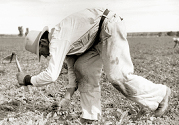| Sustainable Food Guide | Environmental Practice at Work © 2005  |
Issues
| Fair Trade Issues... 'Fair Trade' means an equitable and fair partnership between traders and producers. Most traders are in the developed world, while many producers are in the developing, or underdeveloped world. Food is part of a global food chain. We can purchase food from all over the world that has travelled through several thousand supply chains. Small farmers often work in co-operatives and sell their produce to local middleman in order to access this global market. Rural economies in developing countries such as Africa, Asia and Latin America should benefit from global trading; yet most food producers in the developing world are paid a pittance compared with developed world prices. Often the costs of food production are minimal compared with travel, packaging and mark ups along each stage in the food chain. Exporters, importers, processors and packers all take their income from the supply chain. The small farmer often receives too little to live and plan a life.
Wake up and smell the Coffee Other produce grown in small rural economies include cocoa, bananas, honey and sugar . Workers on plantations often receive subsistence income from long hours in the fields and processing plants. Women are particularly used as cheap labour on many plantations. | |||||||


